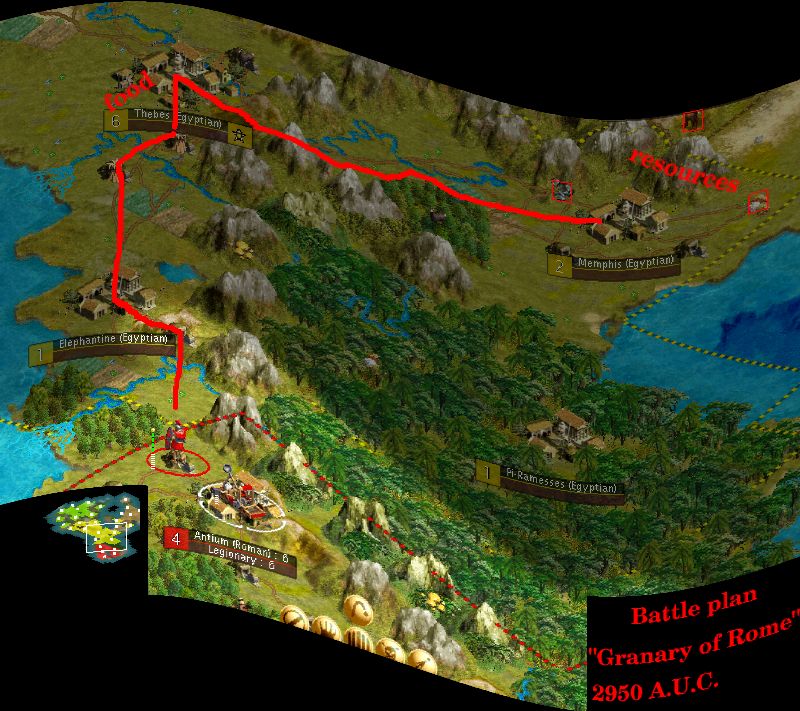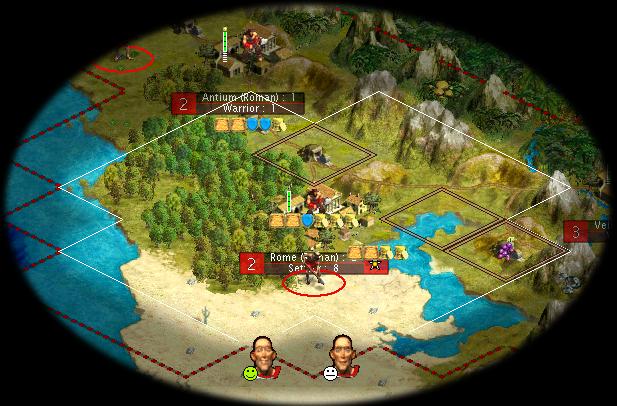(Vanilla predator)
The granaries of Rome
Early in the morning Caesar woke to the bustle of his camp. He left his tent, and looked around.
Just ahead of him, the heavy armour of the Legionaries of the First Roman Army glittered in the bright sunlight. His eyes wandered to the right. In the distance the contours of Elephantine were vaguely visible. Deep down in the valley he could see the river Rubicon that had so long been the boundary with Egypt, but that Cleopatra now claimed was hers, and hers alone.
It was this insolence, and Cleopatra's insatiable thirst for gold, Roman gold, that has caused the crisis that was about to unfold. The glory of Rome demanded the downfall of Egypt.
His attention turned to the battleplan. It was flawless. The initial strike would be against Elephantine, and an attack on the iron mines of Memphis would be imperative. But the main prize was Thebes, the proud capital. Ah, Thebes.... Blessed with fertile lands and abundant wildlife, Thebes was the driving force behind the quick expansion of the Egyptian empire. It woudl supply the Roman empire with the food it needed to grow, more effectively than the granary of Rome ever could. Egypt would be the granary of Rome from now on.
A deep rumble behind him announced the approach of the artillery. Four groups of sturdy catapults, drawn by oxen, the latest development in siege warfare, came moving down the hill of Antium. Behind the catapults was the garrison city of Antium, and behind that, on the other side of the hill, was Rome.
Rome, city of wine and water. It was not founded in a day. His people had wandered the desert for 100 years before finding this spot. After the construction of the Roman Granary, the people had peacefully colonized the area around Rome, founding the cities of Veii, Antium, Cumae, Neapolis...
until it became clear that Egypt would block further peaceful expansion. In 2450 A.U.C. Cleopatra extorted 28 gold from a defenceless people and that was the trigger. Barracks were constructed, and the Romans trained to become fearsome warriors. The exploitation of iron deposits near Cumae, that started some 50 years ago, supplied them with the improved weapons and armor that would be needed against Egypt.
Caesar beckoned his atjutant. Orders were shouted. They would march in one hour, cross the Rubicon by noon, and set up camp on the hill near Elephantine in the evening. From there the catapults could easily fire into the town, and the camp could easily be protected at night. Yes, his plan was flawless.
The year 2950 A.U.C. would go down in history as the start of the ascendancy of Rome.
--------------------------------------------------------------------------------------------
A question of leadership
The campaign was going well. The Roman people enthusiastically supported the war effort, working harder than ever. Elephantine, Thebes and Memphis had fallen quickly. Cleopatra and her ministers had fled to Heliopolis. Not one of the Roman armies had been lost in the attacks. The effect of training, artillery, superior weapons and leadership, no doubt. Caesar could not help but smile at the thought of the hapless, untrained warriors and spearmen of Egypt, and the folly of their generals, who unwittingly moved their troops
out of beleaguered cities.
The success had led Caesar to divide his forces in two. He had left the main force in the hands of his trusty right hand Trajan, and personally took charge of the assault on Alexandria. Caesar took it as a personal affront that Cleopatra had named a city after the Greek leader, just around the time that Greece had declared war on Rome because they wanted to know the secrets of Mathematics.
Needless to say that the Roman explorers axed several Greek troops before a peace treaty was concluded. However, relations between Greece and Rome were sour ever since, and Caesar vowed that
the evil Greeks would have to pay one day.
In 3250 A.U.C. Caesars task force entered Alexandria, which would now be known as Caesarea. Just before the assault, an Egyptian galley was seen leaving Alexandria. Suspicions that it carried Cleopatra and her government were later confirmed, when Roman diplomacy revealed that the small village of Giza became the new Egyptian capital.
In the same year Trajan showed his Great Leadership skills by liberating Heliopolis. From that moment he was known as The Legiondary Trajan.
The question how Trajan could best be employed in the interest of the empire had bothered Caesar for quite a while. With his recent success and popularity it became urgent. Caesar weighed the options. On the one hand, he could give Trajan his own army. Although Egypt would not put up much of a fight anymore, peace with Greece would not last very long. A strong army, led by Trajan, could be useful, especially against the strong Greek hoplites. On the other hand, the Roman empire was getting too large to be ruled by one man. Caesar had been thinking about setting up a second center of government in the lands now held by Greece. There was a good spot near Thermopylae....
The die had to be cast. But which hand would he choose?
--------------------------------------------------------------------------------------------
Money, money, money
The market of Rome opened in 3510 A.U.C. Pecunia non olet, but the market smelled of all that the Roman empire had to offer: spices from Memphis and Caesarea, cattle from Hieraconpolis, game from Thebes, fish from Pisae, even elephants from Hispalis.
Money started rolling in and the treasury was growing day by day. There was little to do with the gold, but Caesar could be heard muttering that the money could be spent to improve cities, once a mythical thing called republic was established. Nobody knew what that was, but rumour had it that a wise man retired to the jungle to find out.
--------------------------------------------------------------------------------------------
An empire lost
Anxiously the settler party watched as Greek and Roman soldiers duelled in the plains near Hispalis. The Romans had the advantage of terrain, but the Greek hoplite defended itself with vigour. When their escort was vanquished, the settlers feared for their lives, but they were spared and would live on to labor for Rome.
The year was 3490 A.U.C. and the war between Greece and Rome had just started.
The Roman attack consisted of three prongs, with the main battle force striking straight at Athens and the main Greek cities on the North Coast, while smaller forces would move along the Eastern and Western Shores. Foolish Alexander spent his resources on building two or three wonders at the time, and Greek resistance crumbled quickly after Romans had taken their iron deposits and horse farms. The hoplites were not all they were cracked up to be, and the Greek counters were feeble and uncoordinated.
Early in the Greek War the city of Trajanopolis was founded, and the Legiondary Trajan rushed hither to establish the second capital of the empire. In 3730 A.U.C. Hadrian showed his brilliance under the walls of Argos. Unfortunately he died in a construction accident in Pisae a few years later, but he will be a shining example for generations to come. And indeed, the year 3810 A.U.C. witnesses the rise of the brave Maximus to the command of the First Roman Army.
Peace was concluded in 4009 A.U.C. with Greece handing over the secrets of construction. With that the Romans entered the Middle Ages.
--------------------------------------------------------------------------------------------
Basic facts, answers to Ainwoods questions:
settled NW-N of start. Initial builds were warriors for exploration, followed
by granary (by this time I had seen about 5 reasonable spots to settle, and a
few unreasonable ones too). After that settlers, warriors,
workers. Exploration revealed that Egypt had a much better start with quite a
lot of the most critical resource: food. Consequently barracks were founded
and warriors were trained.
By 1000BC the Roman empire had the grand total of 15 citizens in 5 cities, 4
workers, 12 veteran warriors and some regulars, 4 catapults, and a phony war
with Greece. Two turns later there would be an active war with Egypt, fought
by warriors-turned-into-legionaries.
Greece had much nicer lands than Carthage, with a good FP spot somewhere in
the middle of their territory. Getting my first GL near the end of the
Egypt War settled their fate.
Nice map btw! I like low food starts, gives you something to do





 Awesome! a superior move. I think this should give you a remarkable advantage. I'm really curious if you can transform it into a superior game.
Awesome! a superior move. I think this should give you a remarkable advantage. I'm really curious if you can transform it into a superior game. . i also used a GL to rush the FP on the south near the old Capitol wich resulted in a very balanced game. Corruption was not a problem even choosing Monarchy instead of Republic
. i also used a GL to rush the FP on the south near the old Capitol wich resulted in a very balanced game. Corruption was not a problem even choosing Monarchy instead of Republic 

 Easy to retake but I lost the units I had in the city. My culture must suck ass (hadn't built a single temple yet as I was busy replacing my fallen soldiers).
Easy to retake but I lost the units I had in the city. My culture must suck ass (hadn't built a single temple yet as I was busy replacing my fallen soldiers).